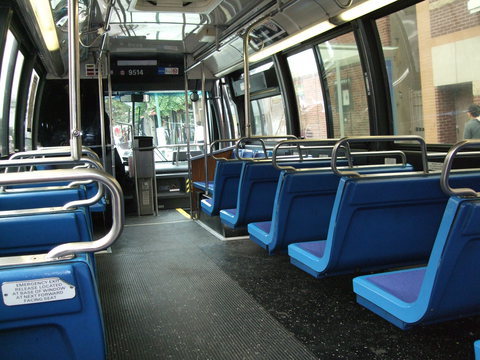The most important election issue that nobody is talking about

(Credit: Kim via Flickr)
One of the most critical issues flying under the radar in this election is public transportation. Although it isn't getting the attention it deserves, all major political parties have pledged new federal investments in transit infrastructure, if they are elected:
The Conservative Party announced a new Public Transit Fund in Budget 2015. The new fund would start in 2017 with an initial investment of $250 million and then ramp up to $500 million in 2018 and $1 billion annually thereafter.
Addressing the Federation of Canadian Municipalities in July, Opposition leader Tom Mulcair pledged that an NDP government would invest $1.3 billion annually over the next 20 years as part of a Better Transit Plan.
The Liberal platform includes a commitment to increasing transit investments by nearly $6 billion over the next four years (triple current levels), and almost $20 billion over ten years (quadruple current levels).
The Green Party platform pledges $764 million in annual support to VIA Rail by 2020. They're also proposing support to provinces and municipalities regarding their public transportation plans, without indicating a set figure for financial contributions.
Significant and timely investment is crucial to build and maintain transit infrastructure in Canadian cities, but we also need ambitious, new ideas to improve the ways we move around. In general, we haven't heard much in the way of creative transit solutions so far.
Giving people transportation options beyond cars is vital for a whole range of reasons, not least because emissions from this sector contribute so significantly to climate change. In Ontario, transportation is the biggest source of greenhouse gases, dumping over 60 million tonnes of carbon dioxide into the atmosphere in 2013 alone. Automobile traffic also costs us time and money. Canadian commuters spend an average of 32 working days a year -- more than a whole month! -- travelling to and from work. Congestion in the Toronto area alone costs $11 billion annually.
So what should the parties be doing? Why not suggest, for example, that our cities take the simple approach of making high-traffic areas more walkable, as was done in New York's Times Square? The Times Square transformation, which was championed by business, created a walk-able, car-free area which is credited with cutting traffic-related injuries.
Some parties propose that electric vehicle charging stations would be a good thing -- that's true -- but it's not clear they have plans to ensure that electricity is drawn from renewable sources. California, by comparison, is committed to getting 50 per cent of its power from renewables by 2030 -- half of their electricity will come from things like wind, water and solar in just 15 years!
Expansive thinking doesn't have to be expensive. In the last few weeks, I've talked to a number of transit experts and one thing they stress is the need to give greater attention to cycling. Getting more people on bicycles would reduce emissions and congestion, save money and improve Canadians' fitness. And it wouldn't be hard to implement. Transit expert Albert Koehl says we could facilitate bike riding simply by lowering speed limits: when cars go slower, cyclists feel safer. Such a move wouldn't take a lot of dollars, just the federal government's willingness to put some pressure on municipalities. But cycling gets almost no mention in the main parties' platforms.
There's also near silence on the idea of moving more freight by train and less by truck. Environmentalists embrace this because, as the Pembina Institute points out, trucks contribute 12 times more GHG emissions than trains. Car drivers would certainly benefit from the removal of monster vehicles that threaten their safety, but somehow mainline politicians don't see the appeal.
In 2011, a total of 2,006 Canadians were killed in car accidents. Today, 10 million Canadians live within 500 meters of a highway or major road and face elevated health risks from exposure to traffic pollution. Over the past 10 years, terrorists have killed two people in this country. If candidates in this election want to take the safety of Canadians seriously, they need to pay more attention to the numbers.
Hey! Want more DSF? Join David Suzuki on Facebook

David Suzuki's Blog
- David Suzuki's profile
- 247 followers



